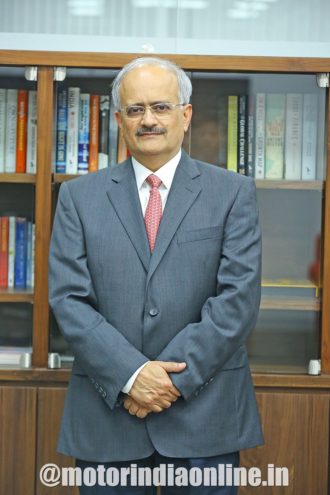Access to working capital and liquidity through banks and non-banking finance companies is what will help kick-start the automotive sector, opines Vipin Sondhi, Managing Director and CEO, Ashok Leyland.

Impact on Business and Recovery Strategy
Everyone is facing this crisis together and restarting businesses to operational health after a shutdown is always challenging. We at Ashok Leyland are prepared and as we recover from this health emergency, we will restart our operations in a safe and sustainable manner. We are putting all measures for operating after the lockdown by accepting the new normal. We have developed workplace policies that provide a safe working environment, while enabling sustainable productivity levels. We are working with our supply chain partners, dealers and all key stakeholders to design processes and material flow in a responsible manner.
BS VI Transition
We have been carefully monitoring and planning the transition from BS IV to BS VI through the second half of the last financial year and have managed our BS IV stocks reasonably well. In fact, we have cleared almost all of it. We are now very excited about our BS VI launch. We have a unique I-Gen 6 Mid-Nox technology to offer which will bring enormous advantages to our customers. This engine technology ensures significantly improved performance. With lower consumption of diesel exhaust fluid and a compact design, I-Gen 6 not only lowers the cost of operation but also offers improved mileage, incremental payload and low maintenance costs. Its unique Mid-NOx strategy ensures better NOx conversion efficiency and hence better engine and EATS durability, leading to lower total cost of ownership. Yes, these are challenging times but I am sure that with these winner products we will ensure a stronger emergence of the business.
Expectations from Government
It would be crucial to kick-start economic activity after this period of disruption. Therefore, in the short term working capital or loan repayment support is much needed from the banking sector. Also, relaxing terms on existing loans through measures like interest deferment and increased moratorium period need to be provided to the end-users. There should be gradual opening of other sectors to revive economic activity and enable employment, especially for casual and daily wage workers. MSMEs are the backbone of the Indian industry and form the key element of the product supply chain, be it agriculture processing, textiles or automotive ancillaries. They will need support from the government.
Some of the measures to be considered would be easy access to working capital and liquidity through banks and non-banking finance companies, providing interest-free and collateral free loans, introduction of an incentive for MSMEs to help them pay salaries and wages to their employees in these times, extension of the NPA recognition period from 90 to 360 days, ensuring that all pending payments to the industry or MSMEs are cleared immediately by the government departments and PSUs, and lastly, incentivizing the MSMEs to produce medical supplies with a buy-back arrangement from the government.
Outlook: Present and Future
While it is difficult to predict when the economy would start turning around and in turn help the commercial vehicle sector, an economic stimulus package would be critical to kick-start economic activity after this long period of disruption. Supply chains need to be re-started, migrant labour needs to come back to work in a systematic and safe manner and consumer demand needs to be triggered. Unless the ecosystem through the value chain opens up, a truck cannot be produced or sold. After the lockdown is lifted we are going to enter into a new era of BS VI where the customers are going to witness a new generation of trucks.
Medium to Long-Term Impact
The CV sector is expected to witness an adverse impact in the short term on account of reduced demand. The need of the hour would be to boost demand. To boost demand and revive economic activity there should be gradual opening of the other sectors with the enabling of employment, especially for casual and daily wage workers. Clear operating guidelines should be provided to ensure social distancing and preventing spread of the virus. Some of the demand side interventions to trigger consumption for individuals, government and corporates) would be:
- Accelerate infrastructure spend of Rs 1.7 lakh crore that is already allocated in the budget to provide immediate impetus to the economy. Significant amount of this money can go towards to each of the 700 districts in the form of low-cost housing and road construction.
- Building agriculture warehousing and cold storage chains near farm gates.
- Scrappage policy for automobiles of more than 15 years to incentivise new purchases.
- Special package required for airlines, bus operators, hospitality, tourism and retailers.
- Export stimulus and re-opening of port operations.